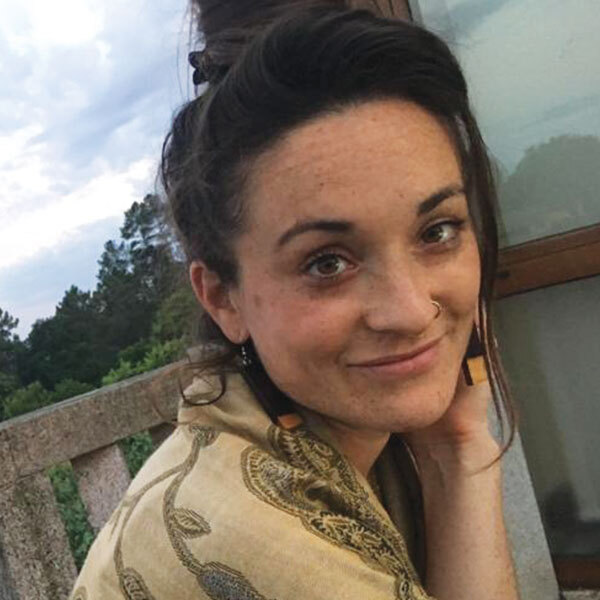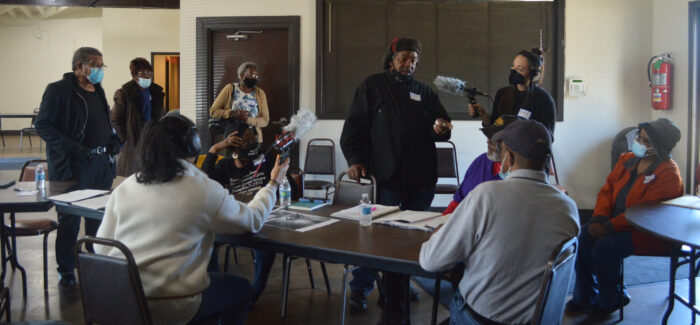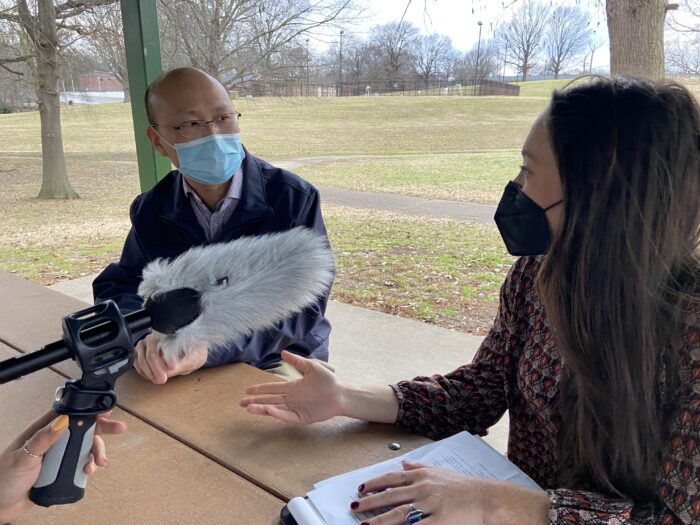Meet the new podcast host for the latest season of Broken Ground

Environmental journalist Leanna First-Arai is the new host of Broken Ground, our podcast digging up environmental stories across the South. The latest season, out now, focuses on the grassroots organizing that led to the cancellation of the Byhalia Pipeline, a crude oil pipeline project that would have continued an unjust pattern of dumping disproportionate amounts of polluting infrastructure in South Memphis.
First-Arai was living in town and teaching English as a Second Language when developers announced plans for the problematic pipeline, immediately catching her attention and prompting her to start gathering information on the project.
Read the interview below, edited for clarity and length, for her insights one of the most high-profile environmental justice wins in recent history and what’s special about the South.
Take us back to when you were living and reporting in Memphis. What brought you there? And what did you learn about the community?
I moved to Memphis with my partner, a professor, while chasing tenure track jobs. He got a job at Rhodes College and I have been taking on the role of the accommodating partner as much as I can. One of my first impressions and one of the most striking things to me about Memphis is that there’s so much trauma in terms of race and class and their overlap. I thought: Wow, there are so many beautiful structures here, and then a couple blocks away, there are others that haven’t attracted the same type of investment as whiter areas due to a long legacy of unjust policy. That became clear immediately. Not long after, I started reporting on an organization called The Lynching Sites Project that helps people of all racial backgrounds sit with the legacy of historical trauma.

How did being a member of that community before plans for the Byhalia Pipeline were announced impact your reporting?
I lived in Midtown, a very white, tree-lined, historically privileged part of town. We rented a little apartment close to one of the biggest parks in town. I teach English as a second language and had gotten to know the parts of town where I was teaching like Whitehaven and Binghampton. I hadn’t spent much time in south Memphis, but when I heard about the proposed pipeline, my ears perked up immediately. It just seemed right off the bat like a potentially problematic thing.
I was curious about tracking down whose proposal it was and who was engaged on it. After attending a couple of meetings the pipeline company held, it became pretty blatantly obvious that they had chosen a neighborhood that I and many white and economically privileged people in Memphis had never been to. It seemed like, if the segregation in Memphis that I had experienced thus far was not top of mind for developers, it was very evident in paying a visit to the area the pipeline was supposed to run through.
What are some themes that come to mind when you think about all that your environmental reporting has revealed?
Many environmental protections exist to protect certain types of people living certain types of ways. There are a lot of protections for what we think of as “nature,” like water, land, soil, flora, fauna, and endangered species, but there’s a big gap in terms of policies and regulations that effectively protect the people who live in and around polluting infrastructure or facilities. They have experienced those egregious gaps in the way we think about what is nature and who belongs where.
Another big thing, which hopefully the EPA will continue to improve under the Biden administration, is the concept of public process. The extreme lack of opportunities to provide public comment on something might seem fine on paper, but it leaves so much to be wanting in terms of actual, meaningful listening and incorporation of community input in any amount.
Reporting on environmental justice is tough, but critical. What about it engages you?

It’s so unbelievable that in the U.S., the zip code you live in determines the quality of air you breathe, water you drink, and how close that water is to EPA contamination limits. It’s such a striking and disturbing truth. I can’t help but be appalled that environmental justice leaders have to do the work they’re doing and they can’t focus on something else because the system we live in allows such inequitable health issues to persist.
I’m less engaged by the stories themselves as much as I am continually appalled that we haven’t been able to do right by organizers who have dedicated their entire lives to just simply securing access to clean water to drink and clean air to breathe. I am very humbled by the lifetime dedication of many of the organizers I meet with.
What’s your podcast recommendation of the moment?
Honestly, I haven’t been listening to much right now because news has consumed every last brain cell I have. My favorite podcasts in general are Drilled, Hot Take, This Land, and How to Save A Planet.
You’ve said your heart is “stuck in Louisiana” – what are your other ties to the South?
I lived in Louisiana for the better part of my 20s. After college, I felt a calling to be there and moved to New Orleans on a whim. I’m from Massachusetts originally and I went to school in Michigan, but I’ve always felt more comfortable in the South. There’s something about the complexities and the people and the food and the languages and the music throughout the South that have always spoken to me, so I stuffed my car up with things and drove on down to Louisiana in 2012. I landed there and stayed as long as I could.
Any favorite Southern places to be in nature?
With respect to my love for Louisiana, I love anything in the Atchafalaya Basin.
Favorite Southern dish or meal?
I’m partial to whatever someone’s grandma is making. It doesn’t matter what it is.
Why should folks listen to the latest season of Broken Ground – any teasers or parting words?
There are so many good voices in this season, amazing organizers and really invigorating humans who shed so much light on both the power of coalition building and the personal toll this work takes.
I’m also excited to share some really poorly recorded tape from when I was doing initial reporting on the Byhalia project. I recorded on my phone in my pocket some of the most unbelievable comments the pipeline developer made and I can’t wait to bring that sort of tape to life and bring people into the room with some of the folks there from the beginning.
I hope people are as excited as I and the podcast team are about getting a glimpse into what a successful campaign looks like and hearing from organizers as they learned. It’s really cool to hear raw reactions to some of the moments that were hard or discouraging.
